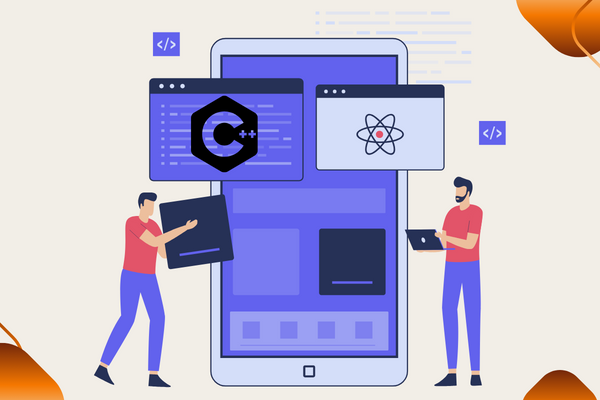Cross-Platform vs Native App Development
When you decide to develop an app, one of the first questions that comes to mind is which platform to choose. There are currently Approx 5 million apps available on both the App Store and Google Play, developed using different technologies.
Choosing between native and cross-platform development has long-term importance in terms of cost, time, and functionality for your company.
In this article, we will analyze both native and cross-platform development and consider the pros and cons of each.
What Is Native App Development
Native app development is a widely widespread method of developing software applications that are optimized for mobile devices. It involves designing and building applications specifically tailored to operate on a particular mobile platform, such as iOS or Android
Using this method enables developers to build robust, high-performing applications that offer a flawless user experience by leveraging the features and capabilities of each platform.
With native app development, developers can ensure that their applications are optimized for the specific hardware and software configurations of each device, making them faster, more dependable, and easier to use than web-based or cross-platform solutions.
Different mobile platforms use varying technologies for app development. For example, Android apps are built using Java or Kotlin, while iPhone apps are developed using Swift or Objective C.
Pros Of Native Mobile App Development
Better Performance
Native apps outperform hybrid or cross-platform apps in terms of performance. This is because native apps do not rely on middleware and instead communicate directly with native APIs. Additionally, native apps are designed to be compatible with the operating system (OS) they run on, resulting in faster processing and improved response times.
Security
When it comes to developing mobile applications, choosing between Cross-Platform vs Native App Development is an important decision to make. One of the biggest advantages of native app development is the enhanced security it offers.
Native apps use security protocols that serve through all operating system layers. This results in data being encrypted within a single infrastructure, significantly reducing security risks.
In contrast, cross-platform or hybrid app development may not offer the same level of security as native apps. Therefore, if security is a top priority for your app, it is recommended to opt for a native app development approach.
Improved Scalability
Native apps are designed to function specifically on an operating system, thereby offering greater flexibility on their native platforms. The architecture of native applications allows them to handle higher user traffic and heavier loads.
Due to their ability to enhance performance, make optimum use of the existing hardware, and reduce the likelihood of app crashes during periods of increased traffic, native apps can be effortlessly expanded as per the requirements.
Cons Of Native Mobile App Development
Time-consuming Development
Developing native applications takes more time compared to cross-platform development. This is because each platform like iOS and Android requires a separate set of codes, causing developers to essentially create two different applications. As a result, the development timeline is significantly extended.
Costly Development
Developing a native mobile app that is functional and user-friendly on both iOS and Android platforms is a challenging and costly task. The process requires the expertise of two separate development teams, each with a unique skill set and a thorough understanding of the respective platform.
This means that the project must be carefully managed to ensure that both teams are working in pairs to deliver a seamless and consistent experience to users. Despite the challenges, launching a native app for both platforms is essential to reach the widest possible audience and maximize the potential for success.
What Is Cross-Platform App Development?
The development of mobile apps that can run on multiple operating systems by using a single codebase and user interface (UI) is known as cross-platform mobile app development
The ability of cross-platform apps to operate on different mobile platforms enables businesses to save on costs and reduce development span.
By opting for cross-platform development, clients can benefit from a solution that is not only cost-effective but also helps quickly launch their apps. So, if you're looking to develop an application without breaking the bank and want to hit the market sooner, cross-platform development is the way to go!
Pros Of Cross-Platform App Development
Reuse Existing Code
When creating or redesigning an application, it is recommended to use a cross-platform framework. This can be especially useful if you are developing a new application that is based on an older one so that code can be easily reused in a new project.
Time-To-Market
Cross-platform development offers a faster time to market by reusing code across multiple platforms. It also makes maintenance and support more efficient by allowing updates and bug fixes to be applied to multiple applications simultaneously.
Easy Maintenance
Cross-platform applications require only one codebase, which means that developers only need to write and maintain one set of programming code. This reduces the costs and time associated with maintaining and upgrading separate codebases for each platform.
Additionally, since updates only need to be made to one codebase, it minimizes the risk of app downtime and ensures that all platforms receive the latest version of the software simultaneously.
Cons Of Cross-Platform App Development
UX And UI Design
Cross-platform app development uses a single codebase for both platforms. However, this approach can limit the functionalities available to developers, which may result in a less satisfactory UX And UI Design Nevertheless, it's worth noting that not all features that cannot be accessed are essential for every project.
Less flexibility than native apps
When it comes to choosing between a unified technology stack and a platform-specific one, it's important to consider the degree of flexibility and integration you need for your solution.
While a unified stack can offer a wide range of functionalities, it may not provide the same level of flexibility as a platform-specific stack. This is because a platform-specific stack is developed specifically to work with the platform and device it's designed for, which can result in seamless integration and improved performance.
On the other hand, cross-platform solutions often require additional development work to achieve the same degree of integration with the platform and device, which can result in a compromise in performance and functionality.
What Should You Choose?
Deciding whether to use Cross-Platform vs Native App Development can be a challenging task. However, the process can be simplified by defining the project's vision and scope. Before choosing a specific technology stack, it is essential to have a clear understanding of the project's goals and objectives.
This will enable you to make an informed decision about which approach will best meet the project's requirements and deliver the desired outcomes. Without a clear vision and scope, it is difficult to determine which option is the right fit for your project.

Read more blogs

Time and Cost of Developing an AI like ChatGPT: Key Factors Explored
Explore the factors influencing the time and cost of developing an AI model like ChatGPT. Understand key considerations for successful AI ap

Guide to Successful Real Estate App Development: Features, Technologies, and More
Explore the advantages of developing a real estate app, key features, technologies to employ, and the importance of collaborating with a Rea

Custom vs. Template-Based Website Development: A Comprehensive Cost Comparison Guide
Explore the costs, pros, and cons of custom website development vs. template-based solutions. Make an informed decision for your online pres
